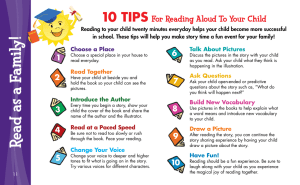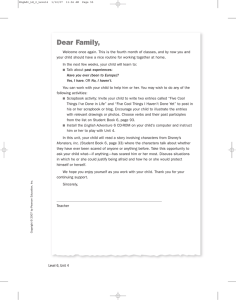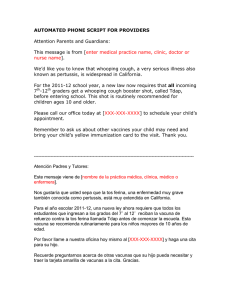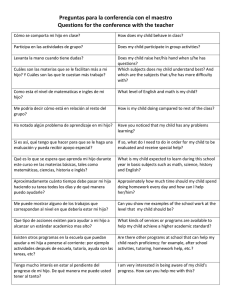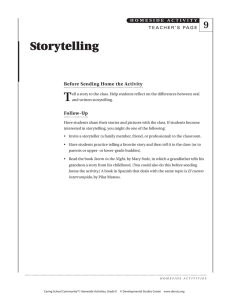Dear Parent or Guardian, Our class has just finished the Fiction
Anuncio
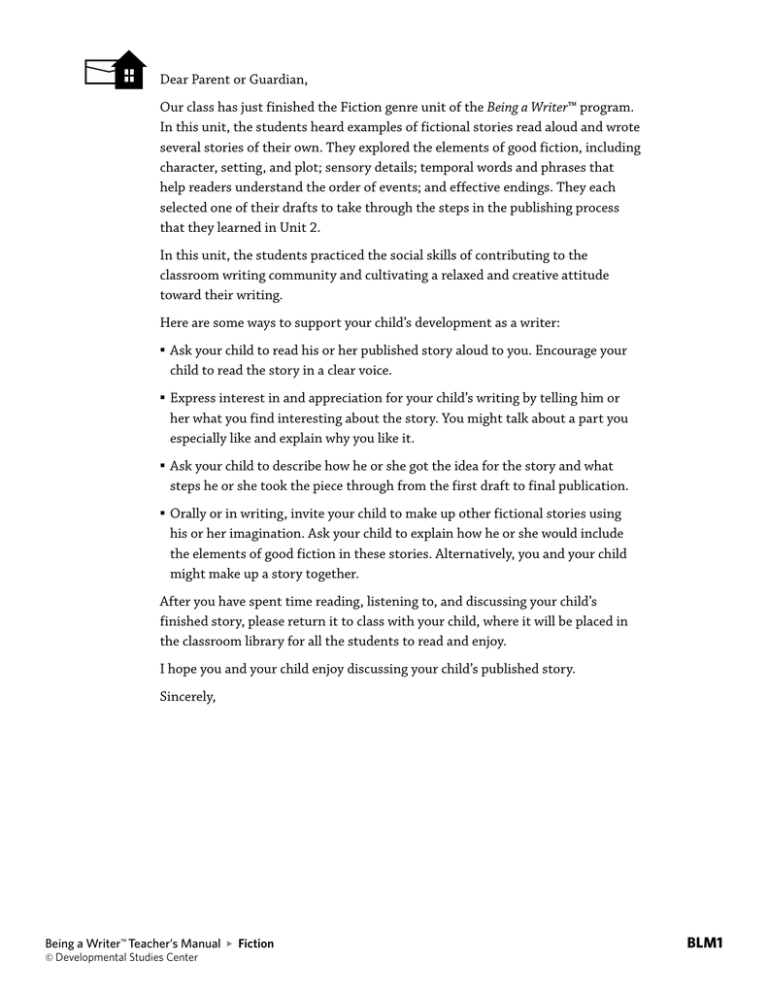
Dear Parent or Guardian, Our class has just finished the Fiction genre unit of the Being a Writer™ program. In this unit, the students heard examples of fictional stories read aloud and wrote several stories of their own. They explored the elements of good fiction, including character, setting, and plot; sensory details; temporal words and phrases that help readers understand the order of events; and effective endings. They each selected one of their drafts to take through the steps in the publishing process that they learned in Unit 2. In this unit, the students practiced the social skills of contributing to the classroom writing community and cultivating a relaxed and creative attitude toward their writing. Here are some ways to support your child’s development as a writer: Ask your child to read his or her published story aloud to you. Encourage your child to read the story in a clear voice. •• Express interest in and appreciation for your child’s writing by telling him or her what you find interesting about the story. You might talk about a part you especially like and explain why you like it. •• Ask your child to describe how he or she got the idea for the story and what steps he or she took the piece through from the first draft to final publication. •• Orally or in writing, invite your child to make up other fictional stories using his or her imagination. Ask your child to explain how he or she would include the elements of good fiction in these stories. Alternatively, you and your child might make up a story together. •• After you have spent time reading, listening to, and discussing your child’s finished story, please return it to class with your child, where it will be placed in the classroom library for all the students to read and enjoy. I hope you and your child enjoy discussing your child’s published story. Sincerely, Being a Writer™ Teacher’s Manual Fiction © Developmental Studies Center BLM1 Estimado padre de familia o tutor: Nuestra clase acaba de finalizar la unidad del género de Ficción del programa Being a Writer™. En esta unidad, los estudiantes escucharon ejemplos de cuentos de ficción leídos en alta voz y escribieron varios cuentos propios. Analizaron los elementos de una buena ficción que incluyen el personaje, el escenario, la trama; los detalles sensoriales, las palabras temporales y frases que ayudan al lector a entender el orden de eventos y los finales con buen efecto. Cada uno seleccionó uno de sus borradores para aplicar los pasos del proceso de publicación que aprendieron en la Unidad 2. En esta unidad los estudiantes practicaron las destrezas sociales de contribuir a la comunidad de escritura de la clase y cultivar una actitud relajada y creativa hacia la escritura. Aquí hay algunas maneras de apoyar el desarrollo de su hijo como escritor: Pídale a su hijo que lea su cuento publicado en voz alta. Estimule a su hijo a leer el cuento con voz clara. •• Demuestre interés y aprecio por los escritos de su hijo al decirle lo que usted encuentra interesante de su cuento. Podría hablar de una parte que le gusta en particular y explicar por qué le gusta. •• Pídale a su hijo que describa cómo encontró ideas para sus textos y qué pasos siguió para convertir un texto del primer borrador a una publicación final. •• Motive a su hijo para que invente otros cuentos de ficción utilizando su imaginación, oralmente o por escrito. Pídale a su hijo que le explique cómo incluiría elementos de buena ficción en estos cuentos. De manera alternativa, usted y su hijo podrían inventar un cuento juntos. •• Después de dedicarle un tiempo para leer, escuchar y hablar del cuento finalizado de su hijo, por favor pídale que lo devuelva a la clase, donde se ubicará en la biblioteca del salón de clases para que todos los estudiantes lo lean y disfruten. Espero que usted y su hijo disfruten al hablar del cuento publicado de su hijo. Atentamente, Being a Writer™ Teacher’s Manual Fiction © Developmental Studies Center BLM1
